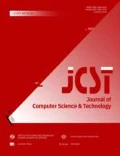Abstract
Semi-imput-memory finite automata, a kind of finite automata introduced by the first author of this paper for studying error propagation, are a generalization of inputmemory finite automata by appending an autonomous finite automaton component. In this paper, we give a characterization of the structure of weakly invertible semi-input-memory finite automata with delay 1, in which the state graph of each autonomous finite automaton is a cycle. From a result on mutual invertibility of finite automata obtained by the authors recently, it leads to a characterization of the structure of feedforward inverse finite automata with delay 1.
Similar content being viewed by others
References
Huffman D A. Canonical forms for information-lossless finite-state logical machines.IRE Trans. Circuit Theory, 1959, CT-6 (special supplement): 41–59.
Kurmit A A. Information Lossless Automata of Finite Order. John Wiley, New York, 1974.
Tao J. Invertible linear finite automata.Scientia Sinica, 1973, 16(4): 565–581.
Tao R J. Invertibility of Finite Automata. Science Press, Beijing, 1979. (in Chinese)
Tao R J. Relationship between bounded error propagation and feedforward invertibility.Kexue Tongbao, 1982, 27(6): 680–682.
Tao R J. Some results on the structure of feedforward inverses.Scientia Sinica, Ser. A, 1984, 27(2): 157–162.
Tao R J. Invertibility of linear finite automata over a ring. InICALP’88, Automata, Languages and Programming, Lecture Notes in Computer Science 317, Springer-Verlag, Berlin, 1988, pp.489–501.
Tao R J, Chen S H. Some properties on the structure of invertible and inverse finite automata with delay r.Chinese J. Computers, 1980, 3(4): 289–297. (in Chinese)
Tao R J, Chen S H. A necessary condition on invertibility of finite automata.Science in China, Ser. E, 1997, 40(6): 637–643.
Tao R J, Chen S H. Constructing finite automata with invertibility by transformation method.J. Computer Science and Technology, 2000, 15(1): 10–26.
Tao R J, Chen S H. Input-trees of finite automata and application to cryptanalysis.J. Computer Science and Technology, 2000, 15(4): 305–325.
Chen S H. On the structure of inverses of a weakly invertible linear finite automaton.Chinese J. Computers, 1981, 4(6): 409–419. (in Chinese)
Chen S H. On the structure of finite automata of whichM′ is an (weak) inverse with delayr.J. Computer Science and Technology, 1986, 1(2): 54–59.
Chen S H. On the structure of (weak) inverses of an (weakly) invertible finite automaton.J. Computer Science and Technology, 1986, 1(3): 92–100.
Chen S H, Tao R J. The structure of weak inverses of a finite automaton with bounded error propagation.Kexue Tongbao, 1987, 32(10): 713–714; full paper inAdvances in Chinese Computer Science, Vol.1, World Scientific, Singapore, 1988, pp. 205–211.
Chen S H, Tao R J. Invertibility of quasi-linear finite automata. InAdvances in Cryptology — CHINACRYPT’92, Science Press, Beijing, 1992, pp.77–86. (in Chinese)
Zhu X J. On the structure of binary feedforward inverses with delay 2.J. Computer Science and Technology, 1989, 4(2): 163–171.
Bao F. On the structure ofn-ary feedforward inverses with delay 1 [Thesis]. Institute of Software, Chinese Academy of Sciences, 1986. (in Chinese)
Bao F. Limited error-propagation, self-synchronization and finite input memory FSMs as weak inverses InAdvances in Chinese Computer Science, Vol.3, World Scientific, Singapore, 1991, pp.1–24.
Bao F. Composition and decomposition of weakly invertible finite automata.Science in China, Ser. A, 1993, 23(7): 759–766 (in Chinese)
Bao F. Two results about the decomposition of delay step of weakly invertible finite automata.Chinese J. Computers, 1993, 16(8): 629–632. (in Chinese)
Gao X, Bao F. Decomposition of binary weakly invertible finite automata.Chinese J. Computers, 1994, 17(5): 330–337. (in Chinese)
Zhou S Y. On the weakly invertibility of type I Abelian FGHSS.Chinese J. Computers, 1982, 5(3): 221–222. (in Chinese)
Lü S Z. Some results on the invertibility of linear finite automata over a ring.Chinese J. Computers, 1991, 14(8): 570–578. (in Chinese)
Dai Z D, Ye D F. Weak invertibility of nonlinear finite automata over commutative rings.Chinese Science Bulletin, 1995, 40(15): 1357–1360. (in Chinese)
Wang H.R a Rb transformation of compound finite automata over commutative rings.J. Computer Science and Technology, 1997, 12(1): 40–48.
Wang H. On weak invertibility of linear finite automata.Chinese J. Computers, 1997, 20(11): 1003–1008 (in Chinese)
Author information
Authors and Affiliations
Corresponding author
Additional information
Supported by the National Natural Science Foundation of China under grant No.60073021 and the NKBRSF of China under grant No.G19990358.
TAO Renji graduated from Department of Mathematics, Peking University in 1957. He is now a professor of the Institute of Software, Chinese Academy of Sciences. His current research interests are automata theory. cryptology and combinatorics.
CHEN Shihua graduated from Department of Mathematics, Sichuan University in 1959. She is now a professor of the Institute of Software, Chinese Academy of Sciences. Her current research interests are automata theory, cryptology and combinatorics.
Rights and permissions
About this article
Cite this article
Tao, R., Chen, S. Structure of weakly invertible semi-input-memory finite automata with delay 1. J. Comput. Sci. & Technol. 17, 369–376 (2002). https://doi.org/10.1007/BF02943277
Received:
Revised:
Issue Date:
DOI: https://doi.org/10.1007/BF02943277




